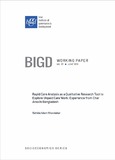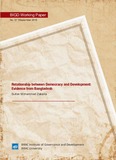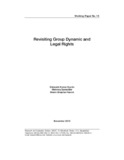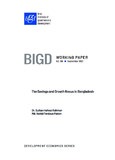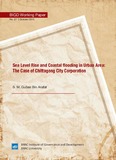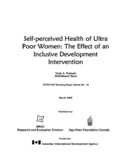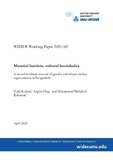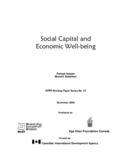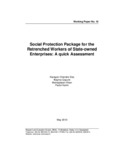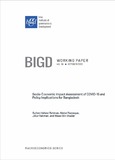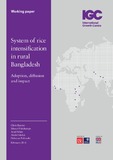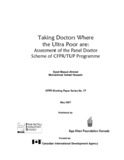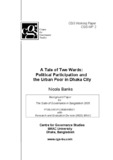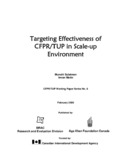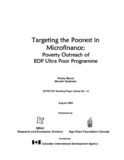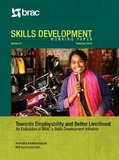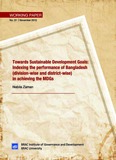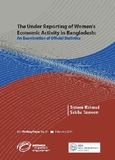Browsing Working Papers (Brac Institute of Governance and Development) by Title
Now showing items 86-105 of 113
-
Rapid care analysis as a Qualitative research tool to explore unpaid care work: Experience from char area in Bangladesh
(BRAC Institute of Governance and Development (BIGD), 2019-06)Every day unpaid care work is carried out all over the world and it is necessary for a society’s wellbeing. However, unpaid care work is largely ignored by economic and social public policy initiatives. Neither is it ... -
Relationship between democracy and development: Evidence from Bangladesh
(BRAC Institute of Governance and Development (BIGD), 2016-09)The paper examines the effect of democracy on the development outcomes of Bangladesh for the period 1972 to 2016. It analyzes both the long-run relation and the direction of causality using the Vector Error Correction Model ... -
Revisiting group dynamic and legal rights
(BRAC Research and Evaluation Division, 2010-11)BRAC Human Rights and Legal Services Program (HRLS) was initiated to form the ward-based Legal Rights Implementation Committee (LRIC) comprised of 19 members to ensure justice for the vulnerable women of the community. The ... -
The savings and growth nexus in Bangladesh
(BRAC Institute of Governance and Development (BIGD), 2021-09)The paper investigates the causal relationship between Bangladesh’s gross domestic savings (GDS) and gross domestic product (GDP). Using yearly time series data from 1980 to 2018, we employ two short-run and one long-run ... -
Sea level rise and coastal flooding in urban area: the case of Chittagong City Corporation
(BRAC University, 2015-10)Sea level rise differs among coasts across the globe due to inherent differences in physical settings and human activities. Projection on relative changes in the sea level is important to understand the possible impacts ... -
Self-perceived health of ultra poor women: The effect of an inclusive development intervention
(BRAC Research and Evaluation Division and Aga Khan Foundation Canada, 2006-03)In 2002, BRAC launched a targeted and comprehensive development program called Challenging the Frontiers of Poverty Reduction: Targeting the Ultra Poor (CFPR/TUP) aimed at the poorest of the poor, who have often been ... -
Sensitizing communities to eliminate discrimination and violence against women: An assessment of Brac’s intervention
(BRAC Research and Evaluation Division, 2012-06)The project titled "Sensitizing communities on CEDAW" was a part of the Gender Quality Action Learning (GQAL) program implemented in Gazipur to sensitize people about CEDAW to prevent violence against women and sexual ... -
Slums During COVID-19: Exploring the Unlocked Paradoxes
(BRAC Institute of Governance and Development (BIGD), 2021)Urban informal settlements commonly known as slums are characterized by a lack of proper housing, tenure security, and have insufficient living spaces and poor access to safe water and sanitation. Due to such living ... -
Social capital and economic well-Being
(BRAC Research and Evaluation Division and Aga Khan Foundation Canada, 2006-11)Sociologists and economists increasingly consider ‘social capital’ a valuable component in the asset endowment of households, improving productivity and enhancing economic well-being. Like physical and human capital, social ... -
Social protection package for the retrenched workers of state-owned enterprises: A quick assessment
(BRAC Research and Evaluation Division, 2010-05)BRAC designed and implemented a project namely Kallyan, aiming to improve the quality of life of the retrenched workers of state-owned enterprises of Bangladesh. This study aimed to map the project’s cumulative achievements ... -
Socio-Economic Impact Assessment of COVID-19 and Policy Implications for Bangladesh
(BRAC Institute of Governance and Development (BIGD), 2020-10)The COVID-19 pandemic is causing unprecedented health and economic crisis for global economies, including Bangladesh. The economic and social disruption caused by the pandemic as reflected in a massive loss of human life ... -
System of rice intensification in rural Bangladesh: adoption, diffusion and impact
(International Growth Centre, 2016-02)The main objective of this study is to understand the network characteristics and incentive mechanism for successful adoption and diffusion of the system of rice intensification(SRI). The researchers examine whether ... -
Taking doctors where the ultra poor are: Assessment of the panel doctor
(BRAC Research and Evaluation Division and Aga Khan Foundation Canada, 2007-05)To facilitate access of ultra-poor households to qualified allopathic care, especially for moderate-to-severe and chronic morbidities, the Challenging the Frontiers of Poverty Reduction/Targeting the Ultra Poor (CFPR/TUP) ... -
A tale of two wards: political participation and the urban poor in Dhaka city
(BRAC University, 2006-12)This paper is based on research conducted by a research team including Ashrafuzzaman Khan , Omar Faruq Siddiki and Md. Bayazid Hasan of RED , BRAC . The author is grateful to professor Nazrul Islam of Centre for Urban ... -
Targeting effectiveness of CFPR/TUP in scale-Up environment
(BRAC Research and Evaluation Division and Aga Khan Foundation Canada, 2006-02)Effective targeting is a hallmark of the BRAC’s CFPR/TUP program. Like many other targeted programs, CFPR/TUP combines a number of targeting methods. Launched in 2002, this program has scaled up in 2005. Despite this scaling ... -
Targeting the Poorest in Microfinance: Poverty outreach of BDP ultra poor program
(BRAC Research and Evaluation Division and Aga Khan Foundation Canada, 2006-08)Despite the general consensus that microfinance does not reach the poorest; recent evidence suggests that nearly 15% of microfinance clients in Bangladesh are among the poorest. It is from the realization that even within ... -
Towards employability and better livelihood: An evaluation of BRAC’s skills development initiative
(BRAC Research and Evaluation Division, 2016-10)BRAC initiated Skills Training for Advancing Resources (STAR) as a pilot project in 2012 with the aim to provide skill development opportunities to urban youth for securing better employment. Several rounds of quantitative ... -
Towards Sustainable Development Goals: Indexing the performance of Bangladesh in achieving the MDGs
(BRAC Institute of Governance and Development (BIGD), 2015-11)The study evaluated the performance of regions in Bangladesh, both across divisions and districts, in their attainment of Millennium Development Goals (MDGs). Based on the data from the Multiple Cluster Survey and applying ... -
Training the disadvantaged youth and labour market outcomes: Evidence from a randomized controlled trial in Bangladesh
(BRAC Research and Evaluation Division, 2018-10)This paper estimates the effects of a youth training program in Bangladesh on labour market outcomes. The program provides on-the-job and classroom training to the disadvantaged and unemployed youth. On-the-job training ... -
The under reporting of women’s economic activity in Bangladesh: An examination of official statistics
(BRAC Development Institute (BDI), 2011-02)In Bangladesh, women are engaged in a variety of economic activities ranging from homestead based expenditure saving activities to outside paid work. However, women’s work always remains under-reported, especially women’s ...

